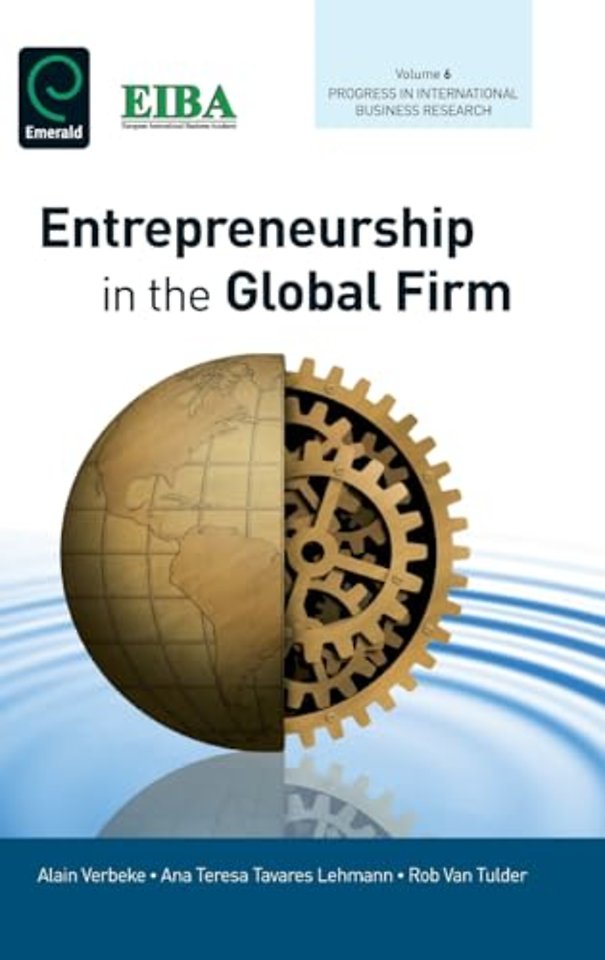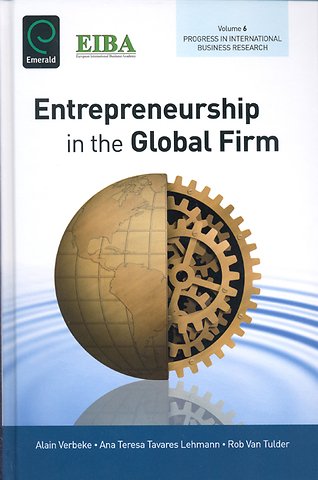Entrepreneurship in the Global Firm
Gebonden Engels 2011 1e druk 9781780521145Samenvatting
'Entrepreneurship in the Global Firm' bevat het meest recente onderzoek over ondernemerschap in multinationals. Het eerste deel van het boek behandelt uitdagingen in kleinere bedrijven die multinationaal opereren. Het tweede deel analyseert een verscheidenheid van problemen in grote multinationale ondernemingen, met een focus op ondernemende initiatieven binnen dochterondernemingen. Het derde deel bespreekt de gevolgen, zowel binnen het bedrijf als in de bredere externe netwerken en clusters waarbinnen de multinationale onderneming opereert.
Specificaties
Lezersrecensies
Over Rob van Tulder
Inhoudsopgave
Part I: Entrepreneurship in the Small, Internationalizing Firm
Chapter 2 SME International Mode Choice Over Time: Forging a Link Between the Uppsala Model and Transaction Cost Economics
Chapter 3 The Effects of Formalisation, Hierarchical Decentralisation and Lateral Communication: Strategic Decision-Making Processes on SME International Performance
Chapter 4 Experiential Knowledge Profiles of Internationalising SMEs – The Ability to Sustain Market Positions in the New Turbulent Era of Global Business
Chapter 5 The Effect of Network Competence and Environmental Hostility on the Propensity of SMEs to Internationalise
Part II: Entrepreneurship in the Large Multinational Enterprise
Chapter 6 Entrepreneurial Deficits in the Global Firm
Chapter 7 Subsidiary Entrepreneurship and Headquarters Involvement During Innovation Development: Dual Paths to Subsidiary Performance
Chapter 8 Successful Subsidiary Strategy Patterns in Different Environments – A Configurational Perspective
Chapter 9 Subsidiary Strategic Evolution in China
Part III: Effects of Innovation and Knowledge Diffusion Processes in Multinational Enterprises
Chapter 10 Offshoring Knowledge Versus Labour-Intensive Services and Entrepreneurial Activity: A Contingency Perspective
Chapter 11 Effects of Subsidiary Autonomy on Innovation Development and Transfer Intensities
Chapter 12 Increasing the Diversification of Technological Knowledge Through R&D Partnerships and Foreign Subsidiaries
Chapter 13 The Innovation Outcomes of MNC Subsidiaries' Local Embeddedness: Evidence from the German 'Bioregion Rhein-Neckar-Dreieck' Local Network
Chapter 14 The Role of Cross-Country Knowledge Spillovers in Energy Innovation
Chapter 15 Clusters, Innovation and Collaboration – The Role of the MNE in Finland
Anderen die dit boek kochten, kochten ook
Rubrieken
- advisering
- algemeen management
- coaching en trainen
- communicatie en media
- economie
- financieel management
- inkoop en logistiek
- internet en social media
- it-management / ict
- juridisch
- leiderschap
- marketing
- mens en maatschappij
- non-profit
- ondernemen
- organisatiekunde
- personal finance
- personeelsmanagement
- persoonlijke effectiviteit
- projectmanagement
- psychologie
- reclame en verkoop
- strategisch management
- verandermanagement
- werk en loopbaan









